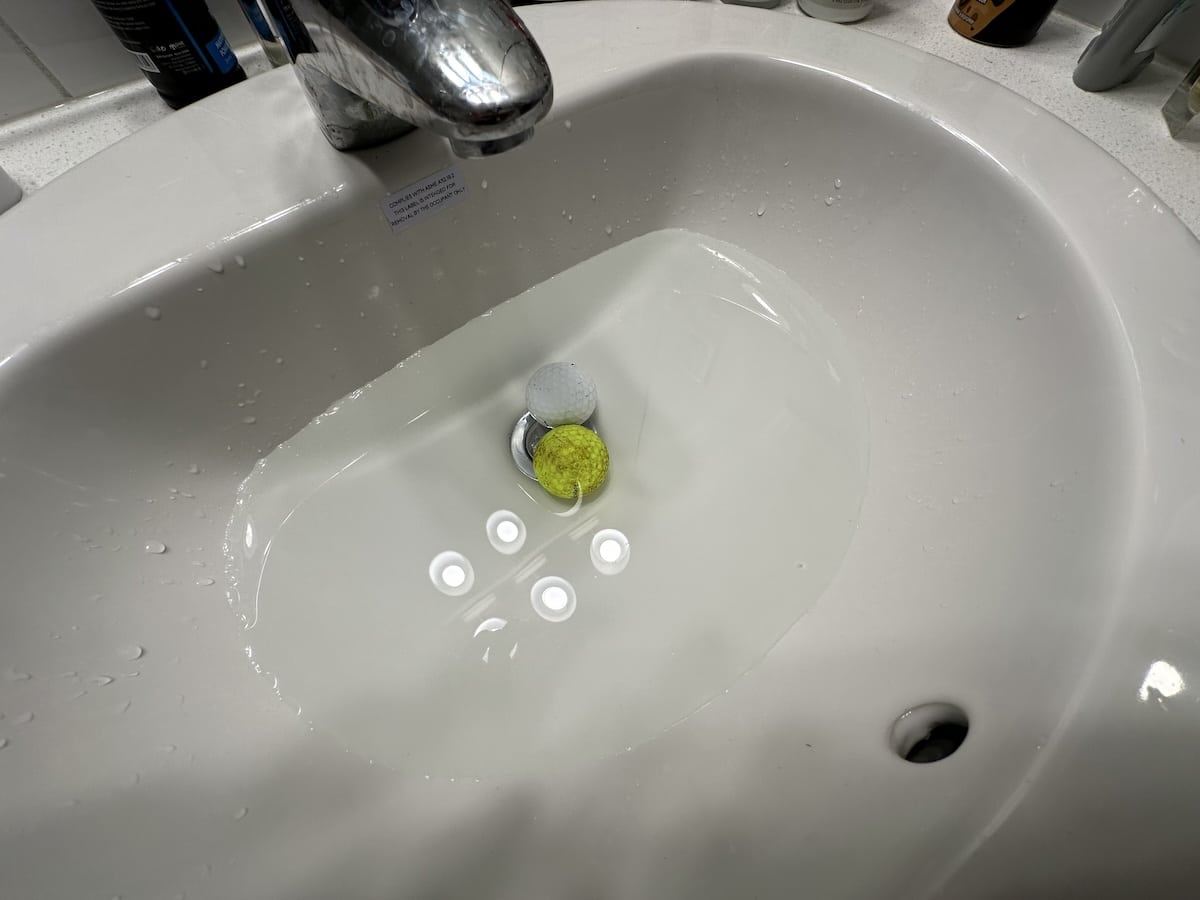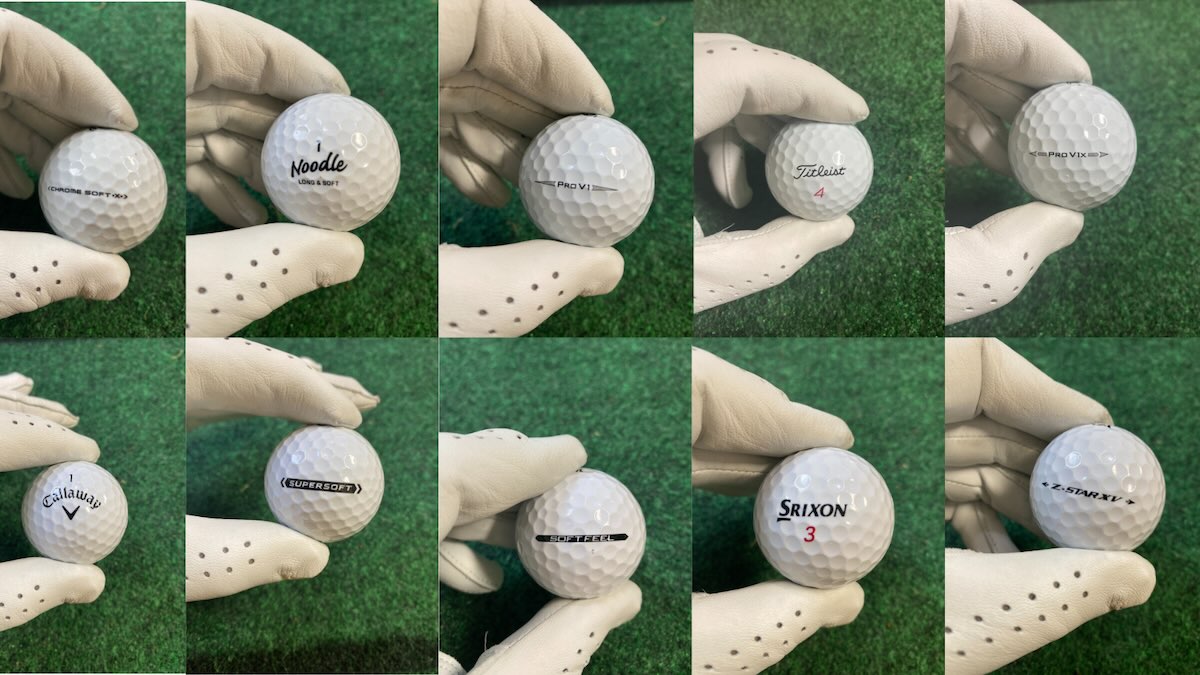Most golf balls don’t float because they’re too heavy.
However, you can buy floating golf balls for fun, even though they’re not legal for tournaments.
I know golf balls don’t float because I’ve lost many in the water hazards. But I wanted to know why they don’t float, so I spent a few days researching it.
What I found out is far more interesting than what I expected. I’ve made this post about my findings, so keep reading to understand why golf balls don’t float.
Normal Golf Balls Don’t Float

Normal golf balls are denser than water, so based on basic physics, they’ll always sink in fresh water.
An average golf ball has a density of 1.13g/cm^3, and the density of the water is 1g/cm^3.
This makes golf balls approximately 13% heavier than water. So down the golf ball plummets into the depths of those troublesome lakes, rivers, and ponds.
Density also has a direct impact on the ball’s buoyancy. A higher-density ball will sink faster, whereas a lower-density core will sink slower. Regardless, however, the standard golf ball will sink.
Another interesting fact I found is that hard golf balls sink faster than soft ones because of the mass of the golf ball.
Also Read: Can Golf Balls Go Bad?
Why Are Golf Balls Heavy?
Golf balls aren’t just heavy for the sake of it. This unit weight is necessary for the ball to travel at optimal distances.
Without mass, the ball would be sorely lacking in aerodynamics. Even a few milligrams of weight taken away would make a huge difference.
You’d have a pretty bad time if you tried to swing and hit a hollow or even a slightly underweight golf ball off the tee.
The core of the ball is where most of its weight is concentrated, and it can consist of one, two, three, or even four layers. However, regardless of the number of layers, the overall weight remains pretty much the same.
- According to R&A and USGA rules, golf balls shouldn’t weigh more than 45.93 grams.
- The diameter of a golf ball is no less than 42.67mm, which means that a fair amount of mass is contained within a small surface area.
Do Golf Balls Float In Salt Water?
Unlike freshwater, saltwater can be denser than a golf ball unit, meaning that some golf balls might float in saltwater.
A water hazard will rarely contain saltwater (although that would save us golfers a lot of balls), but if you happen to be hitting golf balls into the sea, they may indeed float on the water’s surface.
Using salt to float golf balls is also a common experiment in schools. It usually involves placing a ball in freshwater, allowing it to sink, and then adding more quantity of salt solution till the ball comes floating to the top of the water. Science!
Also Read: Can Golf Balls Get Waterlogged?
Floating Golf Balls Are A Novelty
If you’re getting sick of losing golf balls to water, you could consider buying some floating golf balls. They’re built as light as possible without sacrificing too much performance (though they still won’t perform nearly as well as normal golf balls).
Floating golf balls don’t travel as far due to their unique construction and weight. Plus, they’re also very different in their spin rates, compression rates, fall flight, and so much more.
Of course, if you hit them to the middle of the lake, you’ll still have difficulty retrieving these balls. But if they’re close to the edge, and you have some sort of golf ball retriever, getting them back should be fairly straightforward.
| Regular Golf Balls | Floating Golf Balls | |
| Distance | Longer distance coverage (250-300 yards) | Shorter distance coverage (150-200 yards) |
| Material | Urethane or Surlyn | Rubber, Foam, etc |
| Spin | 2000-3000 RPM | 1000-2000 RPM |
| Dimples | 300-500 | 200-300 |
| Weight | 45-46 grams | 36-40 grams |
| Diameter | 1.68 inches (standard) | 1.68 inches (standard) |
| Cost | $10-$50 per dozen | $15-$60 per dozen |
Floating golf balls are great for lakes. Golf ranges with a lake and pools for a fun chipping game.
Specific aquatic driving ranges, such as the Coeur d’Alene resort in Idaho, use floating golf balls.
Related Articles
Abdul Moiz is a skilled golfer and professional writer. He graduated with a Bachelor of Business Administration from the National University of Sciences and Technology in Islamabad and has played golf for over 5 years. He has a handicap index of 18.5, uses TaylorMade Sim driver, and loves his 60-degree wedge. He's tested and reviewed over 50 products and specializes in reviewing budget-friendly golf club sets. You can connect with Abdul at X, LinkedIn, or Work.AbdulMoiz@gmail.com.








